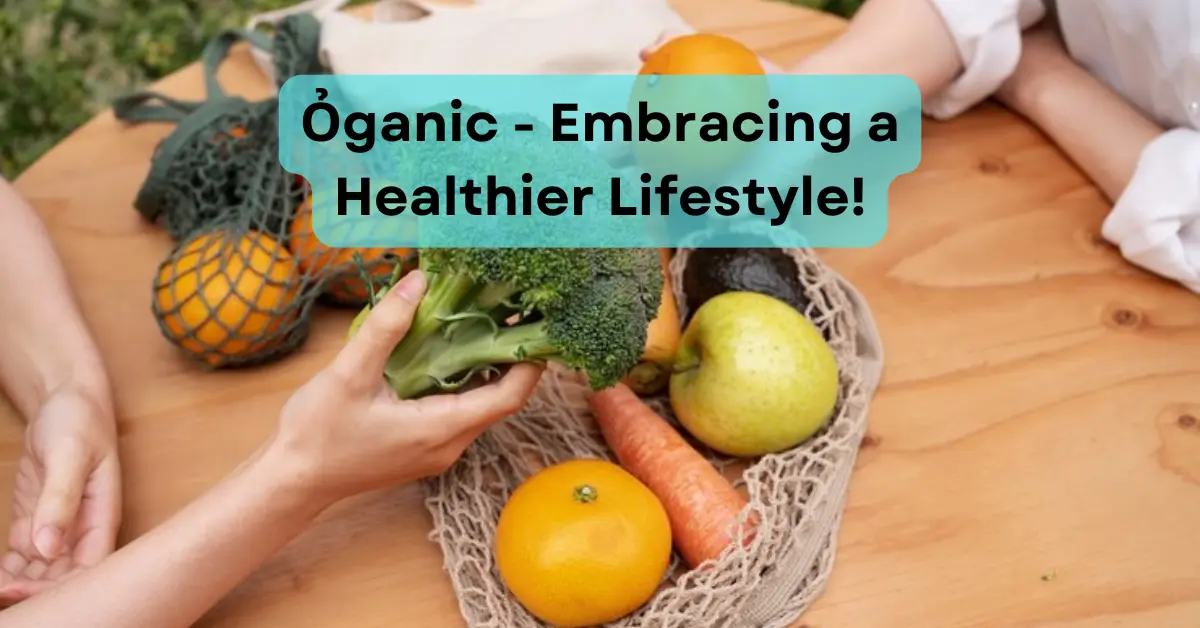Ỏganic – Embracing a Healthier Lifestyle!
ỏganic living involves consuming foods and products made without synthetic chemicals, pesticides, or GMOs, promoting better health and environmental sustainability.
Table of Contents
Introduction to Ỏganic Living:
In today’s world, many people are becoming more health-conscious and environmentally aware. As a result, ỏganic living has gained significant popularity. This lifestyle emphasizes consuming ỏganic foods and products that are produced without synthetic chemicals, pesticides, or genetically modified organisms (GMOs).
By choosing ỏganic, individuals not only support their own health but also contribute to a healthier planet. Let’s explore what ỏganic living means, its benefits, and how to incorporate it into our daily lives.
What Does Ỏganic Mean?
Defining Ỏganic
The term “ỏganic” relates to farming and food production methods that are natural and sustainable. In ỏganic farming, no artificial fertilizers, pesticides, or harmful chemicals are used. Instead, farmers rely on natural processes like crop rotation, composting, and biological pest control. This approach aims to maintain a balanced ecosystem, promoting soil health and reducing pollution.
The History of Ỏganic Farming
The history of ỏganic farming is rooted in ancient agricultural practices. Long before modern farming methods emerged, our ancestors grew crops naturally, using techniques that respected nature. In the early 1900s, pioneers like Sir Albert Howard began advocating for ỏganic methods, highlighting the importance of soil health and ecological balance.
During the 1960s and 1970s, concerns over chemical usage in agriculture sparked a movement towards ỏganic farming. This period saw the establishment of the first ỏganic certification programs, which helped consumers identify ỏganic products in stores. Today, ỏganic farming is recognized globally as a viable and sustainable alternative to conventional agriculture.
Also Read: Dönrt – A Delicious Journey Through Middle Eastern Cuisine!
Why Choose ỏganic Food?
People choose ỏganic food for several important reasons, including health benefits, environmental impact, and personal values.
Health Benefits of Ỏganic Products:
Nutritional Advantages
Research indicates that ỏganic foods can have higher levels of nutrients compared to their conventional counterparts. For example, studies have found that ỏganic fruits and vegetables may contain more antioxidants, vitamins, and minerals. Antioxidants help fight free radicals in our bodies, which can reduce the risk of chronic diseases.
Reduced Exposure to Chemicals
Choosing ỏganic means you are consuming foods with fewer harmful chemicals. Conventional farming often relies on pesticides and synthetic fertilizers, which can leave residues on food. By eating ỏganic, you minimize your exposure to these chemicals, promoting better health, especially for children and pregnant women.
Better for Gut Health
ỏganic foods often contain more beneficial bacteria, which are essential for maintaining a healthy gut. A balanced gut microbiome helps with digestion and can improve overall health. Foods rich in fiber, such as ỏganic fruits and vegetables, support the growth of healthy gut bacteria.
Lower Risk of Antibiotic Resistance
ỏganic farming does not use antibiotics in livestock. This is crucial because overuse of antibiotics in conventional farming contributes to antibiotic resistance, making it harder to treat infections in humans. By supporting ỏganic farming, you help combat this public health issue.
Environmental Impact of Ỏganic Farming:
Promoting Biodiversity
ỏganic farming supports diverse ecosystems. By using natural methods, these farms encourage various plant and animal species to thrive. This biodiversity is vital for a healthy environment and helps create a more resilient food system.
Soil Health and Conservation
The cornerstone of sustainable agriculture is healthy soil. ỏganic farming practices, such as crop rotation and cover cropping, enhance soil fertility and structure. These practices help prevent soil erosion and promote water retention, ensuring that crops can grow effectively.
Water Quality
ỏganic farming protects water sources from contamination. Because it avoids synthetic fertilizers and pesticides, ỏganic farming reduces the risk of chemicals leaching into rivers and lakes. Cleaner water is essential for both human health and wildlife.
Also Read: Trendzguruji.me Health – Your Path to Wellness!
Global Perspectives on ỏganic Farming:
North America
In North America, the ỏganic market has expanded rapidly. More consumers are choosing ỏganic products, leading to an increase in ỏganic farms. The U.S. Department of Agriculture (USDA) has established strict standards for ỏganic labeling, ensuring that consumers can trust the products they buy.
Europe
Europe is a leader in ỏganic farming, with a strong regulatory framework supporting sustainable agriculture. The European Union promotes ỏganic farming through subsidies and policies aimed at reducing chemical usage and encouraging biodiversity. Many European countries have embraced ỏganic practices, resulting in a vibrant market for ỏganic products.
Asia
Asia is seeing a rising interest in ỏganic farming. Countries like Japan and India are exploring ỏganic practices to improve food security and environmental sustainability. Community-supported agriculture (CSA) programs are gaining popularity, connecting consumers directly with local ỏganic farmers.
Africa
In Africa, ỏganic farming offers opportunities for smallholder farmers to enhance their livelihoods. By adopting sustainable practices, they can access premium markets and improve their income. ỏganic farming also promotes food sovereignty, allowing communities to grow food that meets their nutritional needs.
Latin America
Latin America has a rich history of ỏganic farming, often rooted in indigenous agricultural practices. Countries like Brazil and Mexico are home to diverse ỏganic farming systems, which prioritize local knowledge and sustainable methods. The region has the potential to become a significant player in the global ỏganic market.
Ỏganic in Everyday Life:
ỏganic vs. Regular Farming
Understanding the differences between ỏganic and conventional farming can help consumers make informed choices. While conventional farming focuses on maximizing yields through chemical inputs, ỏganic farming emphasizes sustainability and environmental health. Choosing ỏganic products supports farming practices that benefit both people and the planet.
How to Incorporate ỏganic into Your Lifestyle?
Starting Small: Prioritizing Key Products
If you’re new to ỏganic living, start by focusing on the “Dirty Dozen”—a list of fruits and vegetables known to have higher pesticide residues. Buying these items ỏganic can significantly reduce your exposure to harmful chemicals.
Gardening and Growing Your Own
Consider starting your own ỏganic garden. Even if you have limited space, you can grow herbs, vegetables, or fruits in containers. Gardening can be a rewarding hobby that provides you with fresh, chemical-free produce.
Supporting ỏganic Brands and Farmers
Look for local farmers’ markets where you can buy ỏganic products directly from growers. Supporting local farmers not only helps your community but also reduces the carbon footprint associated with transporting food.
Educating Yourself and Others
Learn more about ỏganic practices and the benefits of sustainable living. Share your knowledge with family and friends to encourage them to make healthier choices. Awareness can drive change in your community.
Also Read: Howard A Fetner Dmd News – Everything You Need to Know!
The Future of Ỏganic Living:
Innovations in ỏganic Farming
The future of ỏganic farming looks bright, with new techniques and technologies emerging to enhance sustainability. Innovations like vertical farming, aquaponics, and regenerative agriculture are gaining popularity, allowing farmers to produce food efficiently while minimizing environmental impact.
Policy and Advocacy
Advocacy for ỏganic farming is crucial for its growth. Governments and organizations are increasingly recognizing the importance of sustainable agriculture. Supporting policies that promote ỏganic practices can lead to better funding, research, and resources for farmers.
Global Impact
The global demand for ỏganic products is rising, which presents opportunities for farmers worldwide. As more people seek healthier food options, ỏganic farming can play a significant role in creating sustainable food systems that benefit communities and the environment.
Predictions for Market Growth
Experts predict that the ỏganic food market will continue to grow in the coming years. As awareness of health and environmental issues increases, more consumers are likely to choose ỏganic products. This growth will encourage further research and innovation in ỏganic farming practices.
FAQs:
1. What are the health benefits of ỏganic foods?
Eating ỏganic foods can lead to higher nutrient levels, reduced exposure to harmful chemicals, better gut health, and a lower risk of antibiotic resistance.
2. How does ỏganic farming support the environment?
ỏganic farming promotes biodiversity, improves soil health, conserves water quality, and reduces chemical pollution, contributing to a healthier ecosystem.
3. Why has ỏganic farming gained popularity?
Growing health concerns and environmental awareness have led more consumers to choose ỏganic products, boosting the market for sustainable agriculture.
4. How can I start living ỏganic?
Begin by prioritizing ỏganic versions of the “Dirty Dozen” fruits and vegetables, consider growing your own produce, and support local ỏganic farmers.
5. What is the future of ỏganic farming?
The future looks promising, with innovations in sustainable practices, growing consumer demand, and increased advocacy for ỏganic agriculture worldwide.
Conclusion:
Embracing ỏganic living offers numerous health benefits and contributes positively to the environment. By prioritizing ỏganic foods and sustainable practices, individuals can reduce chemical exposure and support local farmers. The movement toward ỏganic farming is growing globally, fueled by rising awareness of health and environmental issues. Together, we can create a healthier future for ourselves and the planet by making informed choices and advocating for sustainable agriculture practices. Choose ỏganic for a better lifestyle!







